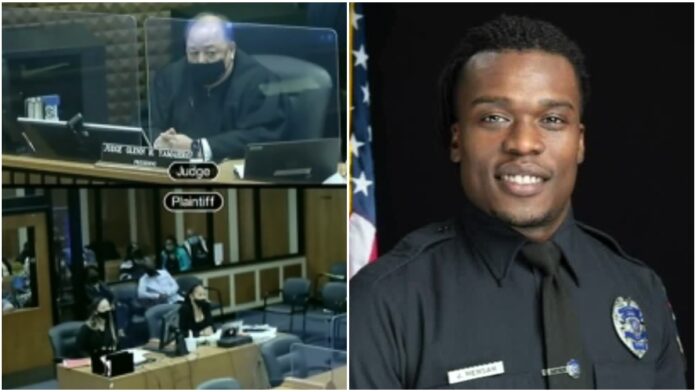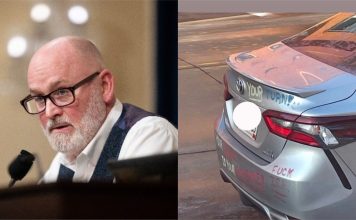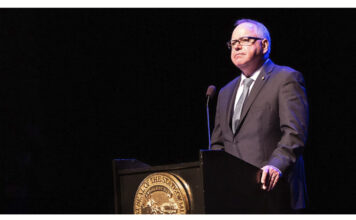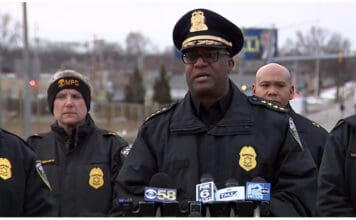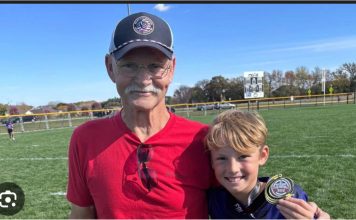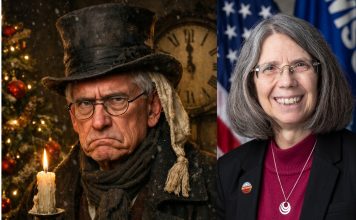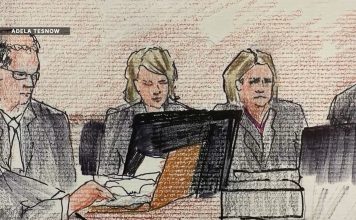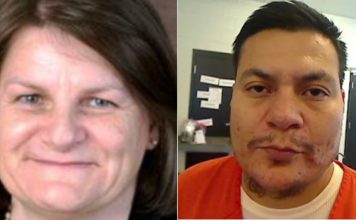Judge Glenn Yamahiro, whose ex-wife and the mother of his child has represented the families of men shot by former Wauwatosa Police Officer Joseph Mensah, used a rare John Doe procedure on Wednesday to find probable cause that Mensah committed homicide by negligent handling of a dangerous weapon in the death of Jay Anderson five years ago.
Yamahiro’s decision, which is unheard of in Wisconsin, runs counter to the decision years ago of an elected prosecutor and former prosecutor. Mensah was already cleared in the 2016 death of Anderson by the elected district attorney John Chisholm and by former US Attorney Steve Biskupic in a report as an independent investigator. Furthermore, a federal review amounted to nothing, and the Milwaukee Police Department did an exhaustive review at the time.
He will appoint a special prosecutor to consider whether to bring a homicide charge. Remember that any charges would need to be proven beyond a reasonable doubt before a jury. That’s a higher standard than probable cause.
[Read our story: 14 key facts to remember about Yamahiro’s decision here.]
In 2016, John Chisholm, the DA, “told Anderson’s family that Mensah’s actions were justified self-defense when he saw Anderson’s hands drop during their interaction,” the Milwaukee Journal Sentinel reported in 2016. Former US Attorney Steve Biskupic also found after a 2020 review that there was insufficient evidence to find Mensah did anything illegal. Biskupic wrote that Mensah said he repeatedly told Anderson not to reach for a firearm on Anderson’s car seat and fired when Anderson reached toward it anyway. Mensah’s lawyer has said Motley doesn’t have any new evidence.
Yamahiro, and only Yamahiro, found otherwise.
“The court finds probable cause that Officer Mensah committed the crime of homicide by negligent handling of a dangerous weapon,” said Yamahiro, citing testimony by a slew of defense experts, including one whose credibility has been challenged.
“This record is filled with testimony of alternative choices that Officer Mensah could have chosen…without shooting Mr. Anderson, including waiting for back up that was already under route.”
He said there was probable cause to believe that Anderson “never lunged for a weapon.” He said the case would be adjourned for 60 days for the court to appoint a special prosecutor.
The charges come at the request of the attorney for Anderson’s family, Kimberley Motley. Yamahiro’s ex-wife, Deja Vishny, was listed as an attorney on the John Doe hearing for the Anderson family for about a week before withdrawing. Vishny works for Motley’s law firm on an “of counsel” basis. Vishny has worked extensively with Motley as a legal team in her persistent efforts to get Mensah charged with homicide. Yamahiro and Vishny also share a child together; Vishny has served as a high-profile Anderson family attorney in the Mensah matters alongside Motley for months.
State law did not allow Mensah’s lawyer to cross examine witnesses during this hearing as he was not a defendant; he did not testify.
Mensah was cleared in two other fatal shootings of men who had weapons at the time. Yamahiro was only asked by Motley to consider a homicide charge in the Anderson death.
It’s unheard of for a law enforcement officer to be charged by a judge after being cleared by prosecutors in Wisconsin, and only a few states have a provision that allows any citizen to request they do so, which was utilized here. (We previously wrote an opinion piece urging the Legislature to close this loophole.)
In a lengthy hearing that started at 10 a.m., Yamahiro went through a detailed description of evidence in the case. That included citing testimony from an expert whose credibility has been questioned.
William Harmening, the Jay Anderson family “expert” who testified against former Wauwatosa Police Officer Joseph Mensah in a new effort to get Mensah criminally charged in the six-year-old shooting death, was rejected as an expert in another police shooting case because a federal judge believed he “lacked the needed expertise” in key areas.
In addition, Wisconsin Right Now found that the professor – who told a judge that Mensah’s use of force was not “reasonable” – was previously accused of presenting a conclusion against a police officer that was “riddled with errors.” Harmening’s expert testimony was limited in other cases, and another judge raised questions about some of his findings. In a Fresno case, he was accused of injecting “mere speculation and conjecture” into his testimony. Read our story on Harmening here.
Mensah is now a Waukesha County Sheriff’s deputy.
What Happened to Jay Anderson Jr.?
The previous report by former U.S. Attorney Steve Biskupic, who said there was insufficient evidence to charge Mensah, gave these details:
On June 22, 2016, Anderson left his home to meet a close family friend at a bar in Milwaukee. Biskupic says that “friends and family members describe Anderson as mild-mannered and pleasant to be around. He was a proud father. Occasionally the stress of having young children at home caused Anderson to want a break to hang out with friends to drink and smoke marijuana.”
Anderson possessed a firearm, a Ruger model SR9c, 9mm, semi-automatic pistol. A friend of Anderson said Anderson possessed it for safety because he lived in a dangerous neighborhood. The gun was purchased by a third party Anderson knew through pick up basketball. How and when it came into Anderson’s possession is unknown.
Anderson had a prior misdemeanor conviction for possession of a firearm while intoxicated.
That night he consumed brandy and smoked marijuana with a friend, who suggested that Anderson go home. His blood alcohol level several hours after leaving the bar was still 0.11. Instead of going home, he drove alone to Madison park in Wauwatosa. The friend said he went there to “chill” and relax.
He entered the park at 1:37 a.m. He likely smoked more marijuana (the car was still filled with marijuana odor when examined by police officers an hour and a half later; and a very small amount of marijuana residue was in a paper fold in Anderson’s pocket.)
Biskupic believes Anderson “likely fell asleep while sitting behind the wheel of the car. His loaded firearm was on the front passenger seat next to him.”The parking lot that night was very dark.
The park was closed per Milwaukee County ordinance.
Mensah driving a Wauwatosa Ford Explorer SUV, entered the parking lot at 3:01 a.m.
He became a probationary police officer on 2015. He completed his probationary period on 2016. He was previously a Dane County deputy sheriff and UW-Madison patrol officer. He was “well-liked by his colleagues and considered by them to be a good officer. His fellow officers continue to strongly support him.” Mensah’s personnel file contains only one disciplinary incident, a letter of reprimand for negligently causing a minor collision. His file contains 14 pages of commendations from citizens and other police departments.
The evidence of what happened is in Mensah’s statements, limited recorded dispatch audio and limited videotape activated by Officer Mensah after he shot Anderson.
Mensah drove into Madison park on routine patrol. The report gave Mensah’s account to another investigator.
It says that he stated that he went to do a park check. The park was extremely dark. He approached Anderson’s vehicle and activated his lights. He thought he saw movement in the vehicle. He approached the vehicle from the passenger side. He used a flash light. He observed the driver was “breathing fast” as if nervous or scared and was lying back against the car seat. He felt he was faking being asleep.
He tapped the passenger front window and announced his name and didn’t get a response. After tapping a few more times, the drive woke up and looked at Mensah, he scanned his uniform and then looked down toward the front passenger seat, and then shrugged his shoulders and closed his eyes, leaning back in the seat.
Officer Mensah reintroduced his name and said “Wake up. Gotta talk to you.” He also said he was with the Wauwatosa Police Department. The drive woke up again, turned the key, and rolled down the window. Mensah asked for an ID. The driver said no.
Mensah was standing an arm length away from the passenger front door. He observed the driver make several glances over to the passenger front seat then back up at him.
Mensah asked the driver if he had anything that would identify his name. The driver said no. Mensah became concerned the driver made several separate and distinct glances toward the passenger front seat. He stepped forward and looking into the interior of the vehicle. Mensah observed a handgun with extended magazine on the front seat.
He said it as hazy with the exact chain of events moving forward but he believed he immediately unholstered his weapon, kept it close to his body and pointed the barrel down tot the group. “I see the gun! Keep your hands where I can see them!” he said.
The driver initially complied and placed his hands in the air about chest or shoulder height. “However he suddenly reached toward the seat with his right hand while looking at the weapon (on the seat.) Mensah stated he immediately moved his weapon to the high ready position and ordered hand’s up and radioed he has a gun! Step it up! The driver placed both hands in the air stating , ‘What? There’s nothing there! It’s nothing!”
Mensah said, “I see the gun! Don’t reach for it!” The driver again reached toward the front passenger seat. Mensah ordered, “Stop reaching for the weapon!” The driver pulled back and said, “It’s nothing.” Mensah said the driver made at least four separate movements with his right arm toward the front passenger seat. Each time Mensah ordered him to stop and the driver returned both of his hands into the air.
Mensah stated the last time the driver made a movement, instead of just his right arm moving toward the gun on the seat, his whole body lunged toward it. Mensah yelled, “Keep your hands up,” but the driver did not comply and Mensah discharged his weapon 3-4 times, Mensah told investigators.
He felt exposed because he was in an open parking lot without any cover. He said he discharged his weapon because he knew the firearm was on the passenger front seat of the vehicle. He stated he ordered and pleaded with the driver numerous times to not reach for the weapon. He shot because the driver reached for the weapon and he believed the driver was going to use it against him.
Previous checks of the park resulted in illegal drugs, stolen cars, and foot pursuits, etc. The squad video shows Mensah standing outside the passenger door with his right arm extended. A subject is sitting in the driver seat and his right arm can be observed in the air. The driver was moving around with both hands in the air. Then, the driver’s right hand was moving side to side. Then movement by the driver is observed and the right hand can be seen extending toward the passenger front seat. The right hand dropped from view. That’s all according to the Biskupic report.
The medical examiner report says Anderson was struck by four of the six gunshots from Mensah’s firearm. Three shots struck Anderson in the head.
The Judge’s Alleged Conflict of Interest
The judge’s ties to Vishny were raising serious concerns about fairness in some corners for months, yet it hasn’t been explored at all in the news media.
For months, Vishny and Motley have been joined at the hip in calling for criminal charges against Mensah, working as lawyers for the Anderson family, firing off a letter opposing a settlement agreement that Mensah entered with the city, demanding open records in Mensah’s cases from the city, challenging curfew violations, and standing arm-in-arm at press conferences calling out Mensah and Wauwatosa in the strongest of terms.

How close are the pair? “Best partner EVER!!” Motley declared about Vishny, a former Milwaukee public defender.
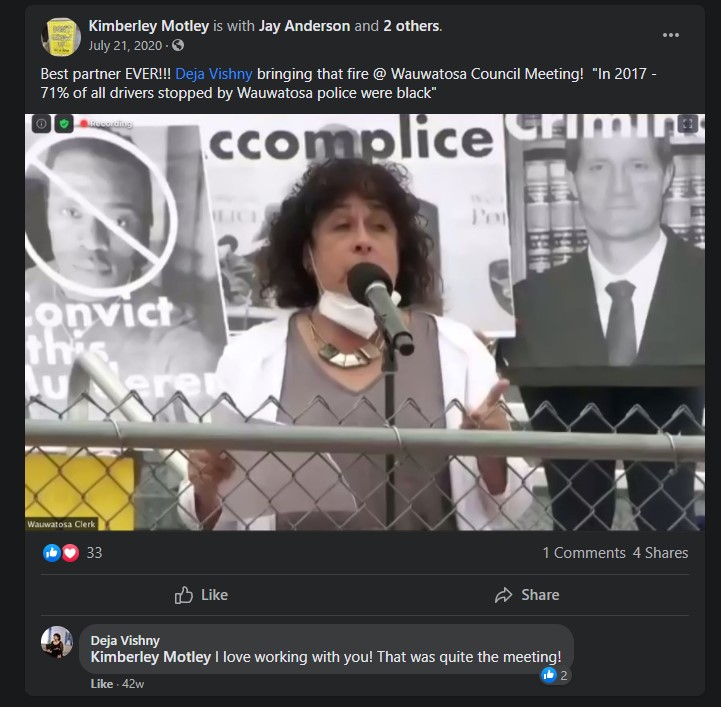

If you think it’s ridiculous that a judge can overrule the decision-making of the DA, blame the Legislature for that, which, a few years ago, after hue-and-cry over the John Doe into then Gov. Scott Walker, limited the John Doe statute to exclude political crime that can affect legislators but left cops at its mercy. The statute allows a citizen to petition a judge to issue a charge when a DA will not; the judge has immense power in a John Doe hearing to do just that.
The Wisconsin case State v. Crystal Harrell involved “a case tried by the district attorney’s office, a circuit court judge, whose spouse is an assistant district attorney in the same county.” The Supreme Court was asked to consider whether state statutes prohibit a judge “from hearing a case when a close relative is ‘counsel thereto’ for either party.” The court found that statutes do not require “a judge to disqualify himself or herself in such a situation as long as his or her spouse did not participate in, or help prepare, the case.”
The 1996 Wisconsin Supreme Court decision also found that a conflict extends to “the attorney of record and any other attorneys who appear or participate in the case.” That case differed in some keys ways from this set of circumstances, though; for example, the court found that prosecutors don’t have a financial interest in the outcome of a case, making the conflict less problematic. In this case, Vishny has been repeatedly identified as an Anderson family attorney, although it’s not clear if she’s getting paid.
Did she help prepare the case? Did she participate?

Wisconsin Institute for Law & Liberty’s Rick Esenberg believes Vishny’s deep involvement in the issue makes the question of recusal more complicated.
“The judicial code defines a member of the judge’s family as follows: ‘Member of the judge’s family’ means the judge’s spouse, child, grandchild, parent, grandparent and any other relative or person with whom the judge maintains a close familial relationship.’ A judge may not sit on a case in which a member of his family is a lawyer,” Esenberg told WRN.
“Maybe recusal is not required by this provision because 1) she is not a lawyer ‘in the proceeding” and 2) the two are divorced. The first argument can work – Justice Ann Walsh Bradley recused herself from the Doe case because her son’s firm was involved – although others read it differently. I recall Justice Steinmetz sitting on cases involving Foley & Lardner even though he had a son and two sons-in-law at the firm. But her involvement in other aspects of the matter make this tougher. The other point – that they are divorced – could succeed as well but may turn on the nature of their relationship. There are other provisions that might be said to apply and also appearance of impropriety standards that are general and broad but that the judge ought to consider.”
Overall, he said it’s not clear or a settled matter in the law.
Certainly, Yamahiro could have chosen to recuse even if not mandated to remove any perception issues in such a contentious case; surely, there are a number of other judges without such close ties to one side who could have heard the case.
How close is Vishny to the case? Consider:
Vishny was an attorney for the Anderson family on the Mensah John Doe case for a week, withdrawing the day after Yamahiro was appointed.

Vishny has a website on which she states that she is “currently of counsel at Nelson Defense Group in Hudson Wisconsin and with Motley Legal nationwide.” Motley Legal is Kimberley Motley’s firm. Motley is the extremely public and aggressive lawyer for the families of those shot and killed by Mensah and the Peoples Revolution protest group.
Court records show that Vishny, whose real name is Deborah Vishny, was divorced from Yamahiro in 2010. They were joint petitioners and there was a petition for child support. He is remarried. A 2004 article on the Urban Milwaukee website confirms that Vishny, a former public defender, was married to Yamahiro. “I’m Glenn’s wife,” she told that reporter, who wrote that “the couple has one child,” who was then in elementary school.
Vishny and Motley have whipped out press releases together calling for the “immediate suspension” of Wauwatosa Chief Barry Weber.

They’ve also worked together on other police-related cases, suing the City of Kenosha on behalf of Jacob Blake protesters who were given curfew tickets.
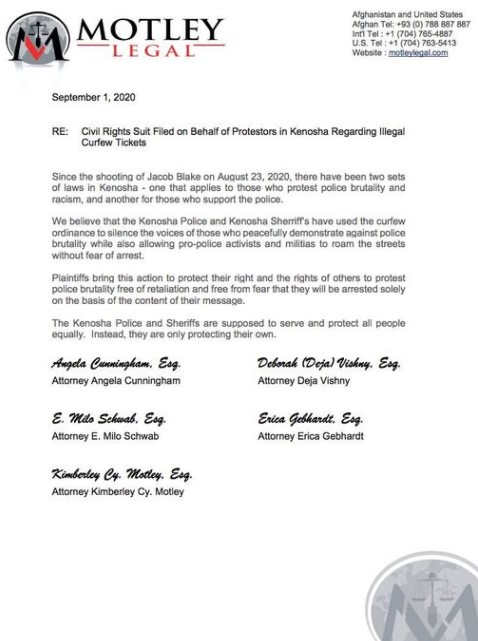
A 2016 article by the Neighborhood News Service quoted Vishny gushing about Motley and says she was her former supervisor.
“I really liked her approach to work,” Vishny told the site. NNS reported that “Vishny worked with Motley in a trial skills program and as her supervisor when Motley joined SPD after graduating from Marquette Law School in 2003.” Vishny gushed in that article about Motley’s tenaciousness and pursuit of what Vishny called “justness.”
The Shepherd Express referred to “Deja Vishny and Kimberley Motley, the attorneys representing the Cole and Anderson families.”
“Motley and Vishny submitted formal complaints to the Wauwatosa City Hall,” that article says. “Vishny and Motley have said that they will use the information revealed by their open records request in the District Attorney’s review.”
There’s more. “Lawyers Kimberley Motley and Deja Vishny issued a letter to Wauwatosa Common Council members, City Attorney Alan Kesner, Police and Fire Commission (PFC) president Dominic Leone, and others on Nov. 18 outlining the ‘strong objections’ they have to the (Mensah settlement) agreement,” according to ABA Journal.
“Motley and Vishny have represented the families of those Mensah has killed, including 17-year-old Alvin Cole. The Motley Legal firm also filed complaints against Mensah on behalf of the families of 25-year-old Jay Anderson, Jr. and 28-year-old Antonio Gonzales.”
What are the rules of judicial recusal? The American Bar Association says:
Other “close personal relationships”—such as amicably divorced individuals who maintain joint custody—require that the judge follow the dictates of rule 2.11(C), which provides for a remittal of disqualification. That rule reads: A judge subject to disqualification under this Rule, other than for bias or prejudice under paragraph (A)(1), may disclose on the record the basis of the judge’s disqualification and may ask the parties and their lawyers to consider, outside the presence of the judge and court personnel, whether to waive disqualification. If, following the disclosure, the parties and lawyers agree, without participation by the judge or court personnel, that the judge should not be disqualified, the judge may participate in the proceeding. The agreement shall be incorporated into the record of the proceeding.
Urban Milwaukee reported that “Attorney Deja Vishny… has worked with Motley on the Wauwatosa cases.”
WTMJ described Vishny as an “Anderson family” attorney.
“There are a lot of changes that need to be made in policing and Wauwatosa Police Department has been a problem,” Vishny told WTMJ.
“Vishny and Kimberley Motley were recently retained by the Anderson family. The attorneys are also working with Alvin Cole’s family,” the television station reported.
They also spoke together in a training session for the National Association of Criminal Defense Attorneys called “Media, the Movement, & Using the Law: Challenging Bad Cops – Kimberley Motley (Milwaukee, WI) and Deja Vishny (Milwaukee, WI).”
They’ve hosted fundraisers together.
Vishny wrote on Twitter in November 2020, “Joseph Mensah’s resignation is long overdue. While we welcome the news; it is tragic that the WPD under Chief Weber’s leadership failed to address his shortcomings for years. It is time for new leadership in the WPD!#stillfightinginTosa”
Vishny criticized the DA’s decision not to charge Mensah in the Alvin Cole case.
“This is a different standard than is used with non-police witnesses,” Deja Vishny said. “This is a culmination of years of not holding police officers criminally accountable for their conduct, and in this community, this has to stop.”
Table of Contents


